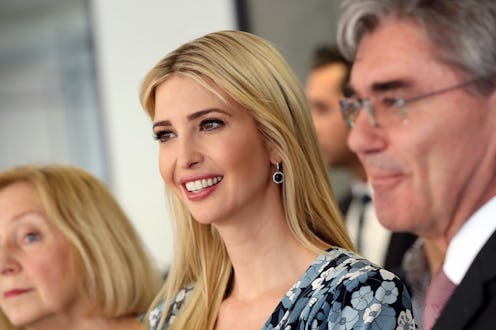News
Ivanka Isn't OK With Being Called An "Accomplice" To Her Father

It's been a busy month for President Trump's special assistant and daughter, Ivanka Trump. Having moved into an office in the White House and accepted a controversial official role in the administration, the days of her solely being a businesswoman are over. Now, she's beholden to the American people and subject to increased scrutiny and criticism from the press. And she responded to some of that criticism on Tuesday in her notably roundabout way. An exclusive interview on NBC News' Today made it clear that Ivanka doesn't like being called her father's "accomplice."
More specifically, the paper Berliner Zeitung ran a front-page headline referring to Ivanka as "First Flüsterin," meaning "first whisperer." The accompanying story, according to CNN, wondered whether she'd act as a moderating influence on her father's presidency — already wracked with scandal and controversy — or whether she would be a "loyal accomplice" to him.
NBC News' Hallie Jackson asked Ivanka what she thought of this description, and received a terse, ever-so-slightly irritated reply. Speaking in a soft voice, Ivanka first praised her father for "curating ideas" and welcoming people with "divergent viewpoints." The oldest Trump daughter then went on to say that she didn't like the word "accomplice," and doesn't find it "productive" for people to say that about her.
Well, I don't like the intonation of that, which assumes that... I think, I don't like the word "accomplice." Because in this context, I don't know that that's productive.
For the record, the definition of "accomplice" isn't simply that you support or go along with someone in a plan. In fact, it refers explicitly to someone participating in criminal activity or wrongdoing.
As such, Ivanka's response calls to mind a question she was asked earlier this month by CBS News' Gayle King about whether she was "complicit" in her father's actions. Like "accomplice," "complicit" refers specifically to someone who's involved in a criminal act with other people, or similar such wrongdoing. Back then, however, her answer left it unclear if she even knew the definition of the word.
If being complicit is wanting to be a force for good, and to make a positive impact, then I'm complicit. I don't know that the critics who may say that of me, if they found themselves in this very unique and unprecedented situation that I am now in, would do any differently than I'm doing. So, I hope to make a positive impact. I don't know what it means to be complicit.
Now, however, it seems like she's decided to outright reject these kinds of accusations and suggestions. If you're curious to see more of the interview, further excerpts are scheduled to air on Tuesday night's NBC Nightly News, with more to come on Wednesday morning's episode of Today.